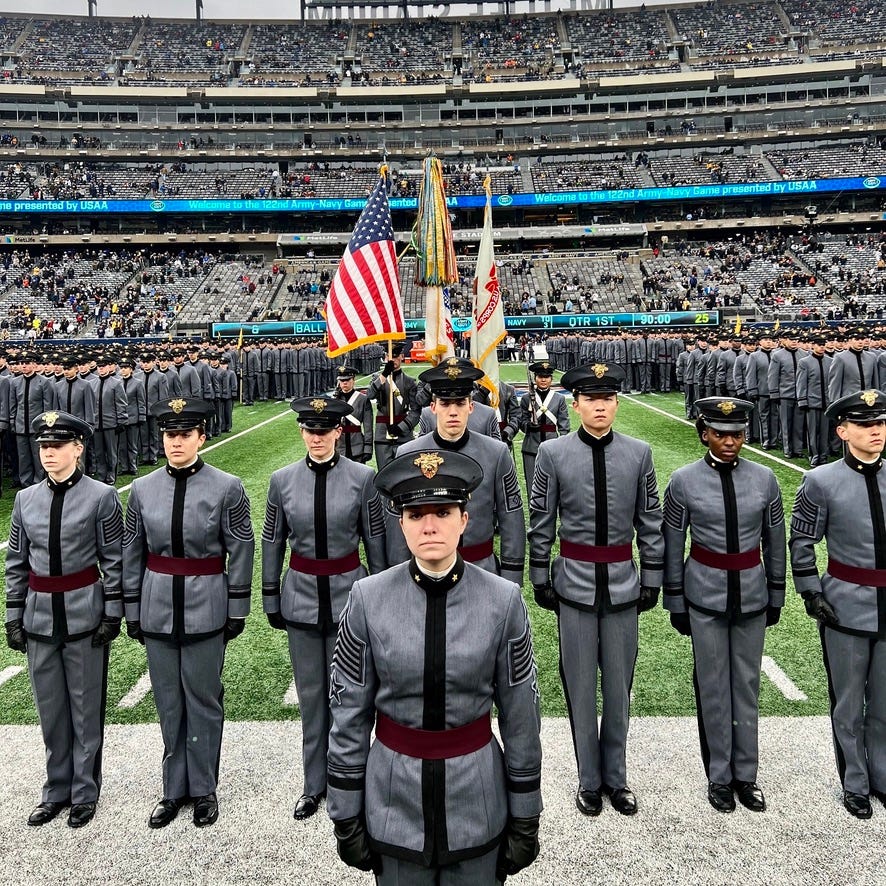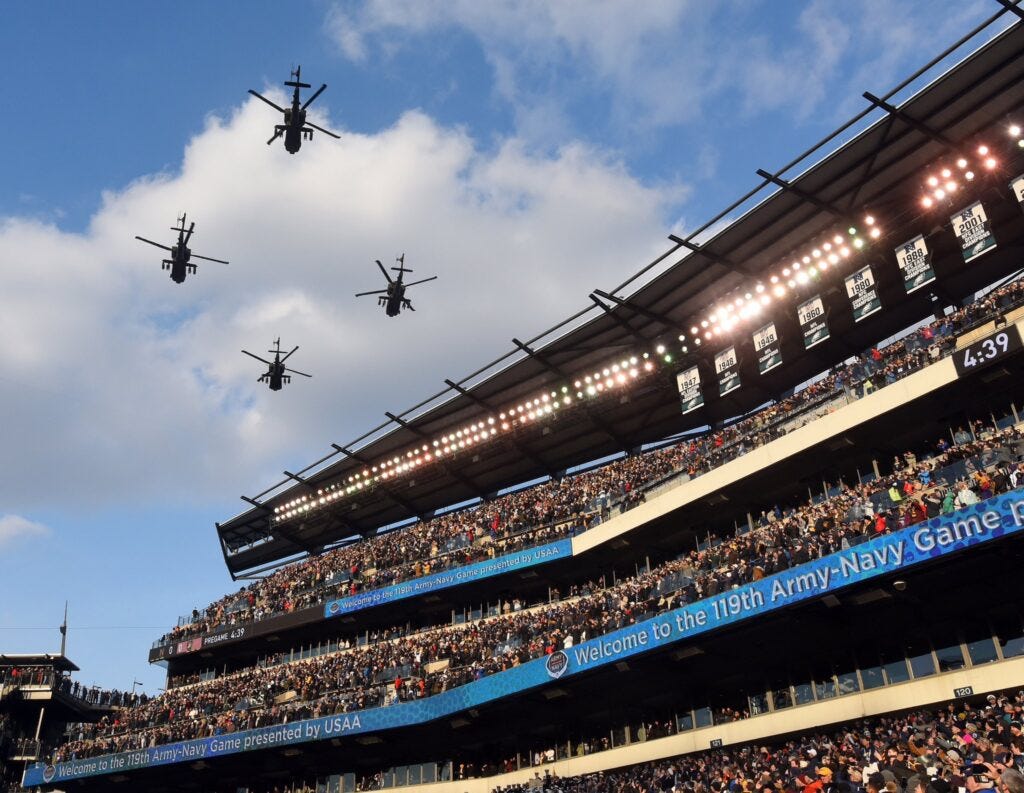Gridiron Bucket Buster: A Fan’s Journey to Witness the Army-Navy Game 125th
Celebrate 125 years of Army-Navy, America’s iconic college football rivalry. Don’t miss this historic clash Saturday, live on CBS.
By Greg Maresca
Michie Stadium opened in 1924 and is renowned for its architecture and picturesque setting along the Hudson River in upstate New York, arguably one of the most iconic venues in college football.
Septuagenarian Peter Costarelli has made the journey to the home field of the Army Black Knights football team at West Point twice over the past half-century. Still, he has yet to attend the granddaddy of college football – Army vs. Navy.
That will end on Saturday.
Costarelli is making the trip to Landover, Maryland, to take in the quasquicentennial game of the longstanding series. In layman’s terms, the matchup’s 125th anniversary.
With final exams being held this week for both the West Point cadets and the Annapolis midshipmen, the run-up to the game for the players, coaches, and student body is unlike any other college football team in the country.
The college football landscape this past week saw record movement on the opening day of college football’s transfer portal. Around 1,000 FBS players entered the portal, which is nearly double the total from day one just a year ago, and it caused an analytics database that many schools use to track movement to temporarily crash, according to 247 Sports. Several quarterbacks were looking to potentially cash in on major name, image, and likeness (NIL) deals with new schools.
This is a nonevent at any of the military academies as there is no NIL fund to be found. In many ways, this defines just who these men are – serving not themselves but something far, much greater – their nation.
Strength of schedule and a season’s win/loss record can both be tossed overboard when it comes time for kickoff. For both the cadets and midshipmen, this is their rightful bowl game, college playoff, and national championship combined into one competition.
Name a university where every student attends at least one game during the season.
That is precisely what will transpire as every cadet and midshipman will be attending Saturday’s game in uniform – no exceptions. Moreover, none of them won’t dare take a seat either throughout the three-hour historic pregame ceremonies or during the actual game – a nearly six-hour exercise in discipline, humility, and esprit de corps.
Costarelli, a north New Jersey native who grew up in the shadows of New York City, is no neophyte when it comes to traveling to historic college football venues that include NFL stadiums. His list is an all-star lineup that has spanned the last two generations: Rutgers, Princeton, Beaver, Christy Matthewson-Memorial, Lycoming, Susquehanna, Redman, Columbia, Yale Bowl, Pitt, Giants, MetLife, Neyland, Orange Bowl, Montclair State, Kean, Newark Bears, San Diego Qualcomm, The Rose Bowl, L.A. Memorial Coliseum, Cal Poly San Luis Obispo’s Mustang Memorial Field, Candlestick, Memorial (Cal Berkeley), Old and new Stanford Stadium.
In between the legion of tailgaters and the actual kickoff, the Army-Navy game is the most unique pregame in college football that commences at high noon with the famous cadet and midshipman walk-on. The game crowns an eclectic and detailed pregame that includes two separate flyovers, followed by the Golden Knights/Para Commandos Jump parachutists and a prayerful invocation by the host academy’s chaplain.
Arriving three hours before the kickoff is the norm rather than the exception.
Costarelli is no casual fan and has a penchant for recalling games, plays, and statistics that would be the envy of all game historians and paste a grin upon every bookmaker.
It was a marching band that captured his most memorable moment, however.
“From watching the sousaphone player dot the “I” in Ohio at the Penn State- Ohio State game at Beaver Stadium in 1996. It immediately sent waves of nostalgia with me watching the OSU-Michigan game on television some 60 years ago alongside my dad when they actually showed the bands during the pregame broadcasts,” reminisces Costarelli.
During World War II, Costarelli’s father, Peter Sr., fought as a U.S. Marine on Guadalcanal in the Solomon Islands.
The trek to Army-Navy for a transplant in Bloomsburg, Pennsylvania, has been long in the coming.
The closest he got to the Army-Navy experience was at their annual sprint football game, which he attended with his two daughters, Miari and Kiara, in New Jersey some 20 years ago. It was then that making the trek to the traditional football game on the second Saturday in December found its way to that longstanding bucket list.
How could it not?
Army-Navy was once a staple of the Philadelphia sports scene as it provided a neutral location between the two academies aptly played in the nation’s founding city. Today, the game is more of a showcase to assist with recruitment and is being played from the Boston area (last year) to the Washington, D.C. area (this year). The game will return to Philadelphia in 2027, with pitstops in Baltimore (2025) and in New Jersey (2026).
There are plenty of rivalries across college football, plain as the list is, as long as it is historic that even a casual fan is familiar with.
From the farthest rivalry in Notre Dame vs. USC that spans over 2,000 miles and once drew 120,000 fans to Soldier Field in Chicago to neighbors Michigan vs. Ohio State. The lesser known but undoubtedly significant Yale-Princeton is the oldest in college football, dating back to 1873, while the most played since 1884, known simply as “The Rivalry,” has a dual Pennsylvania flavor: Lafayette vs. Lehigh.
Sadly, out-of-conference rivalries like Penn State-Pitt matter very little to the powers that be. It is the commercial revenue, broadcast rights, and their expanded footprints that only count.
However, the biggest rivalry from a purely competitive and patriotic standpoint is, without question, Army vs. Navy. The game has deservedly earned the moniker “America’s Game,” making it number one.
The first meeting in 1890 saw the Navy coming out on top 24-0. Navy leads the series with a 62-55-7 record.
Army, at 11-1 and ranked No. 22 in the final College Football Playoff rankings of 2024, won their first American Athletic Conference title last weekend, beating Tulane at West Point, and will face Sun Belt champion Marshall with a 10-3 record on Dec. 28 in the Radiance Technologies Independence Bowl in Shreveport, Louisiana. It will be Army’s 11th bowl appearance. The Black Knights are 7-3 in bowl games and have won five of their last six.
At 8-3, the Navy makes their first bowl game appearance since 2019 as the midshipmen face Oklahoma in the Lockheed Martin Armed Forces Bowl on Dec. 27 at Amon G. Carter Stadium in Fort Worth, Texas. It will be Navy’s third appearance in the Armed Forces Bowl and its 25th bowl appearance overall. The Navy midshipmen, like the cadets at Army, have won five of their last six bowl games.
Be that as it may, every living soul along the Hudson and Severn Rivers knows all too well that Army-Navy is the season’s pinnacle game.
Costarelli is picking Army in what he calls their “dream season” for the cadets along the Hudson, saying, “A great ground attack and defense always yields victory whether on the playing field or the battlefield, and Army brings that to the stadium week after week.”
Since 1996, CBS Sports has been the exclusive home of the Army-Navy game. Last week, the network announced that it has retained its broadcast rights to the rivalry with a new 10-year deal that runs through 2038.
For those whose Army-Navy bucket list remains unfulfilled, CBS Sports will broadcast the 125th edition of this American classic on Saturday from Northwest Stadium in Landover, Maryland, kicking off at 3:10.
And don’t forget, 47 will be there too!











